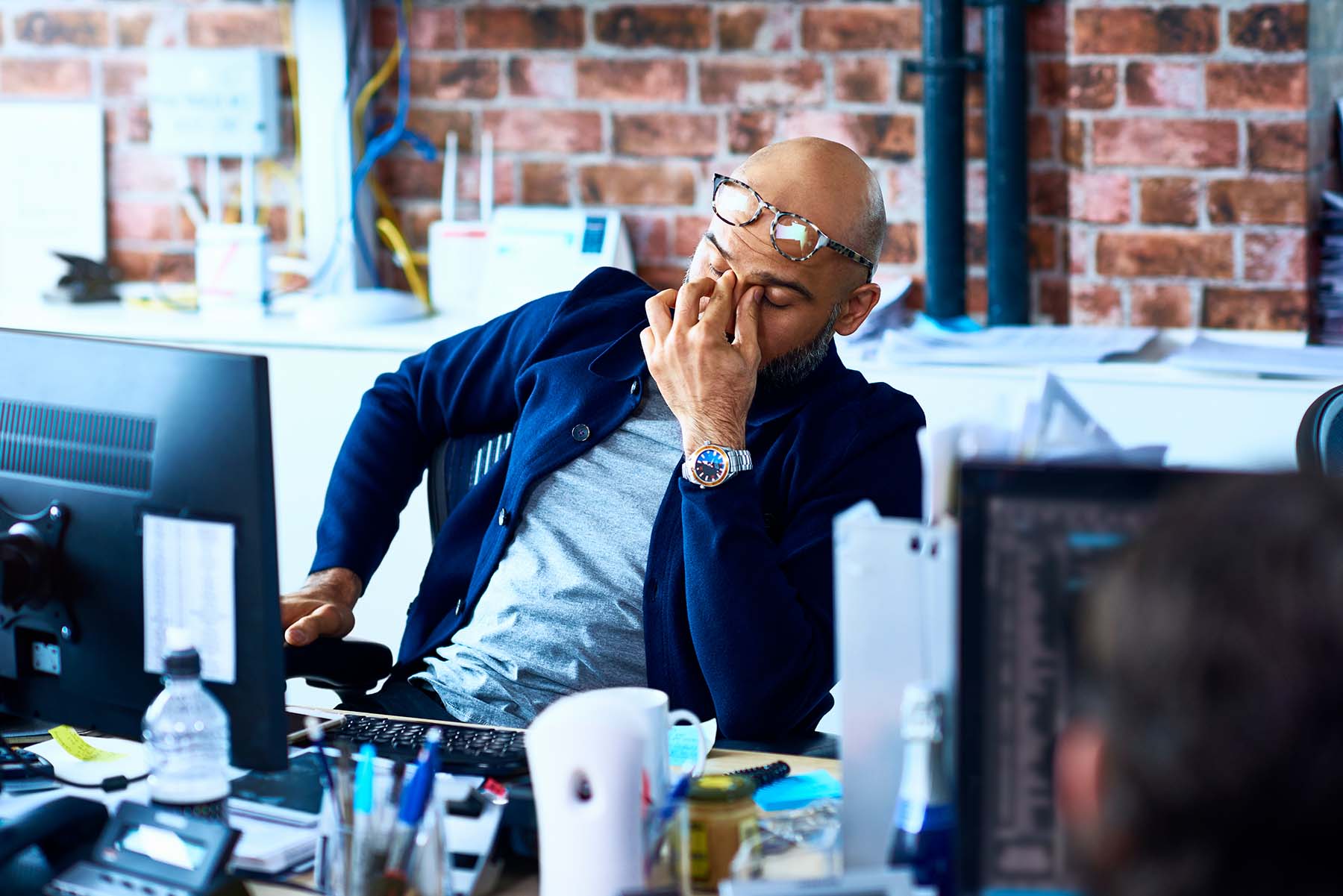How to Beat the Afternoon Slump

Somehow, everyone plows through the inevitable after-lunch grogginess, but some days are worse than others. Our energy wanes, our focus flags.
We want to nap.
“It’s extremely common,” says Jenny Berezanskaya, D.O., an orthopedic sports medicine specialist at the University of Miami Health System. “I don’t think I would be wrong saying that 100% of us experience some sort of crash in the afternoon.”
Blame it on our physiology, she says. Even if you get enough sleep the night before — a big IF in this day and time — our body’s circadian rhythm follows a predictable schedule. The hormone cortisol plays a big part in boosting your energy by managing blood sugar (glucose.)
“Your blood sugar peaks at about 90 minutes after a meal and then begins to drop,” Dr. Berezanskaya says, “and that drop in blood sugar is what gives you that drowsiness.”
For many, this is a signal to reach for an energy drink or an afternoon cup of coffee. But Dr. Berezanskaya says there are better, more natural alternatives to manage that p.m. lull — and they’re relatively easy to follow.
“Caffeine has a lot of benefits, but it can also cause problems later in the day because it may still be in your system when you’re ready to go to bed at night.”
She suggests these alternates:
Watch what you eat.
A big lunch heavy on carbs is guaranteed to put you in a food coma, so she suggests avoiding high-glycemic foods. (Every food is assigned a glycemic index on a scale of 0 to 100, which measures the rise in blood glucose level two hours after consumption.) High glycemic foods are usually starchy ones, such as white bread, potatoes, breakfast cereals, and bagels. Rather than eating dishes that will deepen the crash, try loading up on fruits, vegetables and whole grains. In other words, choose the salad instead of the pizza slice.
“What and how much we eat for lunch really determines how bad the crash will be,” Dr. Berezanskaya says.
“The body is shifting all its energy to the stomach, and a heavy meal will take more energy to digest.”
Get enough sleep — 7 to 8 hours a night on a consistent schedule.
If you’re not getting enough z’s, that sleep deprivation will just make your after-lunch drowsiness worse. If insomnia is a long-term problem, check in with your doctor. Some medical conditions interfere with the quality of nighttime sleep, so it’s important to eliminate them as culprits. In addition to obstructive sleep apnea, these include reflux, restless leg syndrome, chronic stress, depression, anxiety, anemia, and some thyroid disorders. Also, certain medications are known to cause sleepiness.
Catch some rays.
Sunlight affects our circadian clock. We’re more alert when exposed to light, so you might want to step out after lunch to counter the drowsiness. Dr. Berezanskaya also recommends sunlight exposure first thing in the morning to help set your internal clock. Bright light changes the body’s thermoregulation. When sleepy, there is an increase in body melatonin, which is associated with increased body temperature. Bright light can counteract this, resulting in feeling more alert.
Make your space cooler.
A decrease of 1°C in body temperature has been reported to significantly decrease subjective sleepiness.
Take a walk.
It will get your blood flowing and your limbs moving. The change of scenery is likely to give you a boost, too. If you can’t get out of the building, try doing stretches in a secluded part of your workplace. Exercise results in increased blood flow to the brain, which helps with alertness but also increases productivity and memory.
Stay hydrated.
When you’re not getting enough H20, your system slooooows down. Water, however, will help carry oxygen and nutrients to your cells and, therefore, make you feel less tired. Dr. Berezanskaya says women should aim to drink 2.7 liters and men 3.7 liters a day. This, of course, includes water and other fluids.
Take a power nap — but don’t overdo it.
She suggests up to 30 minutes. Anything longer will affect your nighttime sleep.
Reach for a healthy snack.
Light snacks throughout the day will keep your energy level steady. It also goes a long way to tamping down your hunger at lunchtime so you’re not overeating. Fruit, plain yogurt, and carrot sticks are good choices. If you have a sweet tooth, consider dark chocolate – the higher the cocoa content, the better, with 85% getting Dr. Berezanskaya’s nod. The cocoa-flavanols in chocolate increase blood flow to the brain, she explains, and improve the survival, growth, and function of neurons. This has been shown to improve attention and executive function and reduce task-related fatigue.
Nonetheless, “don’t overdo it,” she warns, with a laugh. “A couple of squares are plenty.”

Written by Ana Veciana-Suárez, a regular contributor to the University of Miami Health System. She is an acclaimed author and journalist who has worked for The Miami Herald, The Miami News, and The Palm Beach Post.
Tags: alternatives to energy drinks, feel sluggish, tired in the afternoon
